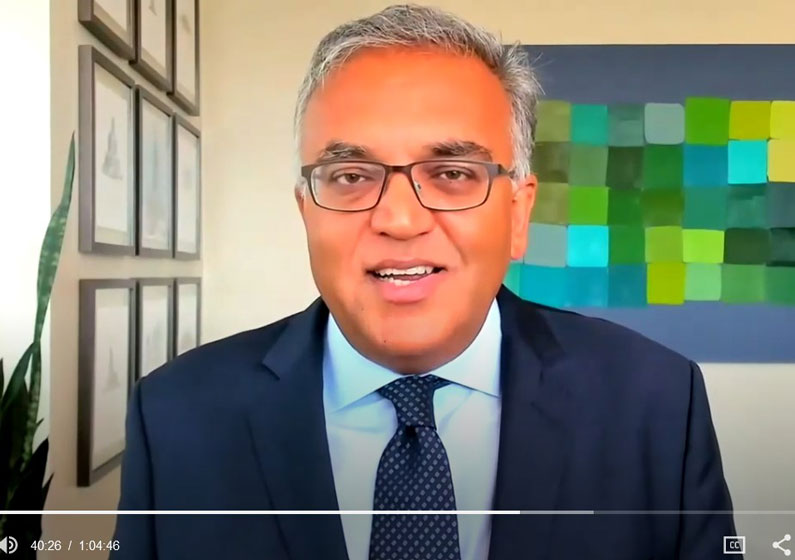Collaboration and information management may have a lasting legacy

In addition to being a public health challenge, pandemics are also an economic and social challenge. This was Dr. Ashish K. Jha's opening message during the Contemporary Clinical Medicine: Great Teachers Lecture on September 8, when he laid out several lessons learned from this pandemic and suggested some solutions.
Dr. Jha is recognized as a global expert on pandemic preparedness and response. As an accomplished physician, health policy researcher and global health advocate, he has contributed his expertise to the public through appearances with local, national and global news outlets. He has also advised mayors, governors and members of Congress on the pandemic response. Jha recently ended his term as faculty director of the Harvard Global Health Institute to become the dean of the School of Public Health at Brown University.
Over the course of his remarks, Jha outlined three lessons from the COVID-19 pandemic.
Lesson#1: Scientists have made extraordinary progress in responding to pandemics.
Scientists did an incredible job and were very successful in their relatively short rollout of an effective vaccine. They developed vaccines in record time and delivered 5.2 billion doses worldwide. They have conducted research and provided data on masks, diagnostics tests, therapeutics and cleaning indoor air.
Lesson #2: Some of the best information has come from outside the biomedical community.
Information and findings have come from computer scientists, economics and sociologists. A lasting legacy from this health crisis should be continued and expanded collaboration among these fields.
Lesson #3: To change the public's behavior, we need to understand what people value.
Science, data and facts do matter. However, to counter misinformation and disinformation, the public health community could improve its own communication.
In Jha's view, scientists should be open and honest about what they do or do not know, while still providing knowledge and best judgement. Too many times, the scientific community has been afraid of causing panic and has hesitated to sound the alarm. Scientific leaders need to communicate the fact that science is not an established set of facts, but a process.
He also outlined the need to tailor recommendations based on people's lived experiences. When advising people to stay home, for example, that guidance neglected to take into account those who could not do so, such as essential workers, and failed to recommend the steps they could take to stay safe.
Finally, Jha explored the rising tide of distortion and half-truths circulating through public discourse. The pandemic has created not only a lot of misinformation, but intentional disinformation. Unfortunately, everyone tends to live in his or her own echo chamber. We all listen to things that reinforce our current beliefs.
The misinformation machine is a large, sophisticated operation that requires not just experts, but all of us, to combat it. People can start by getting out of their own echo chambers. Actively seeking news from different sources and talking to people outside our bubble with kindness and understanding can help reveal why people think how they do.
"People want to participate, want to understand how decisions are made. We should welcome that. We should welcome people into the process and help them understand why experts believe what they believe," said Jha.
Jha closed by saying that people should not leave the job of communicating solely to experts. Every person has a role to play to counter misinformation, whether by social media, newspapers, television or just conversations with neighbors. To ensure an informed discourse, we all need to communicate good, high quality information.
- Debbie Accame

